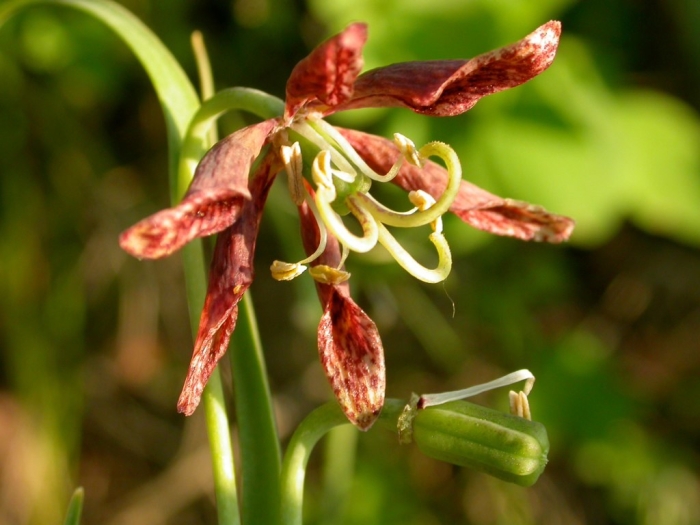Spotted Fritillary
(Fritillaria atropurpurea)
Spotted Fritillary (Fritillaria atropurpurea)
/
/

Matt Lavin
CC BY 4.0
Image By:
Matt Lavin
Recorded By:
Copyright:
CC BY 4.0
Copyright Notice:
Photo by: Matt Lavin | License Type: CC BY 4.0 | License URL: http://creativecommons.org/licenses/by/4.0/ | Rights Holder: Matt Lavin | Publisher: iNaturalist | Date Created: 2003-06-02T19:51:32-07:00 |























Estimated Native Range
Summary
Fritillaria atropurpurea, commonly known as Spotted Fritillary or Purple Fritillary, is a perennial herb native to the mountainous regions of the western United States, including California, Arizona, Oregon, and extending to North Dakota. It is typically found in open woodlands, meadows, and grassy slopes at elevations of 3,300 to 10,500 feet, where it thrives in well-drained soils rich in organic matter. The plant reaches a modest height of 4 to 16 inches (10 to 40 cm) and features narrow, lance-shaped leaves. The distinctive nodding flowers, which appear from late spring to early summer, have yellowish or cream-colored tepals heavily mottled with dark purple-brown, giving them a striking appearance.
Spotted Fritillary is valued for its unique, checkered flowers that add an exotic touch to rock gardens, woodland plantings, and naturalized areas. It is relatively low-maintenance, requiring minimal water once established and preferring partial shade to mimic its native understory conditions. While not commonly used in large-scale cultivation, it is sought after by enthusiasts of native and alpine plants. Gardeners should be aware that Fritillaria species can be susceptible to bulb rot if planted in poorly drained soils.CC BY-SA 4.0
Spotted Fritillary is valued for its unique, checkered flowers that add an exotic touch to rock gardens, woodland plantings, and naturalized areas. It is relatively low-maintenance, requiring minimal water once established and preferring partial shade to mimic its native understory conditions. While not commonly used in large-scale cultivation, it is sought after by enthusiasts of native and alpine plants. Gardeners should be aware that Fritillaria species can be susceptible to bulb rot if planted in poorly drained soils.CC BY-SA 4.0
Plant Description
- Plant Type: Herb, Bulb
- Height: 0.5-1.5 feet
- Width: 0.5-1 feet
- Growth Rate: Moderate
- Flower Color: Brown, Purple, White, Yellow
- Flowering Season: Spring, Summer
- Leaf Retention: Deciduous
Growth Requirements
- Sun: Full Sun, Part Shade
- Water: Medium
- Drainage: Medium
Common Uses
Low Maintenance, Rock Garden
Natural Habitat
Native to open woodlands, meadows, and grassy slopes in mountainous regions
Other Names
Common Names: Spotted Fritillary, Purple Fritillary, Spotted Missionbells
Scientific Names: , Fritillaria atropurpurea, Amblirion album, Fritillaria adamantina, Fritillaria alba, Fritillaria atropurpurea var. gracillima, Fritillaria gracillima, Fritillaria linearis,
GBIF Accepted Name: